Posted by: site admin @ 9:45 pm
video is about dream vision of J Chandrasekharan who has constructed
Kushinara Nibbana Bhumi Pagoda Bengaluru, This pagodan is built where
people can come make use of the place and get maximum benefit.

 Bell Peppers
Bell Peppers Cucumber
Cucumber  Carrots
Carrots  Beans in pots like Free Birds
Beans in pots like Free Birds  in Vegan
in Vegan  White Home to make the hungry minds to glow like Lotus.
White Home to make the hungry minds to glow like Lotus.Aboriginal Awakened Societies Thunder ” Hum Prapanch Prabuddha
Prapanchmay karunge.” (We will make the whole world Prabuddha Prapanch
at $62.00 which plays a role in generating energy in the human body
available ‘for the price of a coffee a day’ a Stunning anti-ageing
breakthrough could see humans live to 150 years and regenerate organ.New
process has been found by Harvard Professor David Sinclair and
researchers from the University of New South Wales, involving cell
reprogramming.
to the University of Singapore survey/review based on 131 countries.
From June 18, world will be 100% free and happy from December 8th. Their
predictions about Italy and Spain fit exactly.
of COVID Tests Says Pandemic is Biggest Hoax Ever Perpetrated It is
like a blind man searching for a black cat in a dark room which is not
there.
video is about dream vision of chandrashaker who has build terrace
vipassana pagoda in Bangalore,new thippasandra, This pagodan is built
where people ca…

WORLD WILL BE FREE FROM HOAX - STRENGTHENING THE TRUST FOR BEST OF HEALTH -SINGAPORE UNIVERSITY SURVEY
the Sutta:The recitation of the Ratana Sutta is a powerful blessing for
protection and an aid for every meditation leading to Nibbàna. The
Buddha, the
Peace, recited this Sutta in the city of Vesàli, India, and as a result,
calamities caused by famine, evil spirits and disease vanished
completely. Furthermore, hundreds of thousands of critically ill people
recovered instantly and 588,000 people, who attained supramundane Paths,
Fruitions, and thus Nibbàna, bore witness to this extraordinary event.
The unique power in the recitation of the Ratana Sutta, based on the
boundless power of the Buddha’s command, surpasses all arts of magical
devices (yantras), spells (mantras) and occultism.
Status, Mahamangal sutta meaning , महामंगल सुत्त, Buddhist Chant, Maha
Mangal Sutta meaning, Greatest happiness, Mahamangal sutta Lyrics ,
महामंगल सुत्त, Buddhist Chant, Maha Mangal Sutta Lyrics, Whatsapp Status
Video, Whatsapp Video Status, Whatsapp Status Video 2020, New Whatsapp
Status Video, New Whatsapp Status Video 2020, jay bhim whatsapp status,
jay bhim whatsapp status video, Buddhist whatsapp status 2020, jay bhim
whatsapp status full screen, jay bhim whatsapp status dj, jay bhim
whatsapp status video hindi, jay bhim whatsapp status hindi, jay bhim
whatsapp status new, jay bhim whatsapp status link, jay bhim dialogue,
jay bhim dialogue whatsapp status, jay bhim whatsapp song, jay bhim
status hindi 2020, mahamangal sutta status, Buddha TeachingBuddha
Preaching Buddha Pali TeachingBuddha Geet Buddha Latest Song Hindi Song
buddha buddha vandana, buddha song, buddham saranam gacchami, buddha
amritwani, buddha aale janmas, buddha ani tyancha dhamma, LORD buddha, a
buddha 2005, buddha bhagwan, buddha bhajan, buddha boy, buddha bowl,
buddha chant, buddha channel,buddha chi gani,buddha dharma,buddha
dhammabuddha deva tuzi dnyanganga,buddha episode, buddha english movie,
buddha quotes,buddha film, buddha face, buddha festival,buddha
geete,buddha gyan, buddha gaya temple, buddha’s reaction, buddha
history, buddha in hindi, buddha jeevan charitra
Copyright Disclaimer Under Section 107 of the Copyright Act 1976,
allowance is made for “fair use” for purposes such as criticism,
commenting, news reporting, teaching, scholarship, and research. Fair
use is a use permitted by copyright statute that might otherwise be
infringing. No copyright infringement intended for music video. All
rights reserved to the respective owners. For promotional/entertainment
purposes only. If you wish to remove this, please contact us
vishalhborkar@gmail.com & Youtube Private Messaging System LIKE |
COMMENT | SHARE | SUBSCRIBE THANKS FOR WATCHING !!!!!!!!!!
Credits: Youtube channel “Power by Wikiread” Buddhist Buddhist Ratana
Sutta by Priya Barua With nice VoiceSinger: Priya BaruaSong: Buddhist
Buddhist Ratna Sutta || Special Thanks to: Priya BaruaYoutube:https://www.youtube.com/watch?v=8ILWR…
#RatanSutta #SuttaNipata #Buddhism #TheBuddha #LordBUddha #BuddhaStatus
#BabasahebAmbedkar #FirstlyIndian #StayHomeStaySafe #JaiBhim
#DrBRAmbedkar #JayBhimvideos #JayBhimWhatsappstatusvideos
#FullscreenAmbedkarStatus #JayBhimsongs #AmbedkarWhatsappstatus
#Ambedkarvideosongs #AmbedkarstausWhatsapp #Ambedkarvideosongs
#Ambedkarstaussongs #JayBhimnewstaus #JayBhimIndia #ratansuttapali
#ratansuttasong
bhikkhave, puññābhisandā kusalābhisandā sukhassāhārā sovaggikā
sukhavipākā saggasaṃvattanikā, iṭṭhāya kantāya manāpāya hitāya sukhāya
saṃvattanti. katame aṭṭha?
bhikkhave, ariyasāvako buddhaṃ saraṇaṃ gato hoti. ayaṃ, bhikkhave,
paṭhamo puññābhisando kusalābhisando sukhassāhāro sovaggiko sukhavipāko
saggasaṃvattaniko, iṭṭhāya kantāya manāpāya hitāya sukhāya saṃvattati.
caparaṃ, bhikkhave, ariyasāvako dhammaṃ saraṇaṃ gato hoti. ayaṃ,
bhikkhave, dutiyo puññābhisando kusalābhisando sukhassāhāro sovaggiko
sukhavipāko saggasaṃvattaniko, iṭṭhāya kantāya manāpāya hitāya sukhāya
saṃvattati.
caparaṃ, bhikkhave, ariyasāvako saṅghaṃ saraṇaṃ gato hoti. ayaṃ,
bhikkhave, tatiyo puññābhisando kusalābhisando sukhassāhāro sovaggiko
sukhavipāko saggasaṃvattaniko, iṭṭhāya kantāya manāpāya hitāya sukhāya
saṃvattati.
bhikkhave, dānāni mahādānāni aggaññāni rattaññāni vaṃsaññāni porāṇāni
asaṃkiṇṇāni asaṃkiṇṇapubbāni, na saṃkiyanti na saṃkiyissanti,
appaṭikuṭṭhāni samaṇehi brāhmaṇehi viññūhi. katamāni pañca?
bhikkhave, ariyasāvako pāṇātipātaṃ pahāya pāṇātipātā paṭivirato hoti.
pāṇātipātā paṭivirato, bhikkhave, ariyasāvako aparimāṇānaṃ sattānaṃ
abhayaṃ deti, averaṃ deti, abyābajjhaṃ deti. aparimāṇānaṃ sattānaṃ
abhayaṃ datvā averaṃ datvā abyābajjhaṃ datvā aparimāṇassa abhayassa
averassa abyābajjhassa bhāgī hoti. idaṃ, bhikkhave, paṭhamaṃ dānaṃ
mahādānaṃ aggaññaṃ rattaññaṃ vaṃsaññaṃ porāṇaṃ asaṃkiṇṇaṃ
asaṃkiṇṇapubbaṃ, na saṃkiyati na saṃkiyissati, appaṭikuṭṭhaṃ samaṇehi
brāhmaṇehi viññūhi. ayaṃ, bhikkhave, catuttho puññābhisando
kusalābhisando sukhassāhāro sovaggiko sukhavipāko saggasaṃvattaniko,
iṭṭhāya kantāya manāpāya hitāya sukhāya saṃvattati.
caparaṃ, bhikkhave, ariyasāvako adinnādānaṃ pahāya adinnādānā
paṭivirato hoti. adinnādānā paṭivirato, bhikkhave, ariyasāvako
aparimāṇānaṃ sattānaṃ abhayaṃ deti averaṃ deti abyābajjhaṃ deti.
aparimāṇānaṃ sattānaṃ abhayaṃ datvā averaṃ datvā abyābajjhaṃ datvā,
aparimāṇassa abhayassa averassa abyābajjhassa bhāgī hoti. idaṃ,
bhikkhave, pañcamaṃ dānaṃ mahādānaṃ aggaññaṃ rattaññaṃ vaṃsaññaṃ porāṇaṃ
asaṃkiṇṇaṃ asaṃkiṇṇapubbaṃ, na saṃkiyati na saṃkiyissati, appaṭikuṭṭhaṃ
samaṇehi brāhmaṇehi viññūhi. ayaṃ kho, bhikkhave, aṭṭhamo puññābhisando
kusalābhisando sukhassāhāro sovaggiko sukhavipāko saggasaṃvattaniko,
iṭṭhāya kantāya manāpāya hitāya sukhāya saṃvattati.
caparaṃ, bhikkhave, ariyasāvako kāmesumicchācāraṃ pahāya
kāmesumicchācārā paṭivirato hoti. kāmesumicchācārā paṭivirato,
bhikkhave, ariyasāvako aparimāṇānaṃ sattānaṃ abhayaṃ deti averaṃ deti
abyābajjhaṃ deti. aparimāṇānaṃ sattānaṃ abhayaṃ datvā averaṃ datvā
abyābajjhaṃ datvā, aparimāṇassa abhayassa averassa abyābajjhassa bhāgī
hoti. idaṃ, bhikkhave, pañcamaṃ dānaṃ mahādānaṃ aggaññaṃ rattaññaṃ
vaṃsaññaṃ porāṇaṃ asaṃkiṇṇaṃ asaṃkiṇṇapubbaṃ, na saṃkiyati na
saṃkiyissati, appaṭikuṭṭhaṃ samaṇehi brāhmaṇehi viññūhi. ayaṃ kho,
bhikkhave, aṭṭhamo puññābhisando kusalābhisando sukhassāhāro sovaggiko
sukhavipāko saggasaṃvattaniko, iṭṭhāya kantāya manāpāya hitāya sukhāya
saṃvattati. ime kho, bhikkhave, aṭṭha puññābhisandā kusalābhisandā
sukhassāhārā sovaggikā sukhavipākā saggasaṃvattanikā, iṭṭhāya kantāya
manāpāya hitāya sukhāya saṃvattantī”ti.
caparaṃ, bhikkhave, ariyasāvako musāvādaṃ pahāya musāvādā paṭivirato
hoti. musāvādā paṭivirato, bhikkhave, ariyasāvako aparimāṇānaṃ sattānaṃ
abhayaṃ deti averaṃ deti abyābajjhaṃ deti. aparimāṇānaṃ sattānaṃ abhayaṃ
datvā averaṃ datvā abyābajjhaṃ datvā, aparimāṇassa abhayassa averassa
abyābajjhassa bhāgī hoti. idaṃ, bhikkhave, pañcamaṃ dānaṃ mahādānaṃ
aggaññaṃ rattaññaṃ vaṃsaññaṃ porāṇaṃ asaṃkiṇṇaṃ asaṃkiṇṇapubbaṃ, na
saṃkiyati na saṃkiyissati, appaṭikuṭṭhaṃ samaṇehi brāhmaṇehi viññūhi.
ayaṃ kho, bhikkhave, aṭṭhamo puññābhisando kusalābhisando sukhassāhāro
sovaggiko sukhavipāko saggasaṃvattaniko, iṭṭhāya kantāya manāpāya hitāya
sukhāya saṃvattati. ime kho, bhikkhave, aṭṭha puññābhisandā
kusalābhisandā sukhassāhārā sovaggikā sukhavipākā saggasaṃvattanikā,
iṭṭhāya kantāya manāpāya hitāya sukhāya saṃvattantī”ti.
caparaṃ, bhikkhave, ariyasāvako surāmerayamajjapamādaṭṭhānaṃ pahāya
surāmerayamajjapamādaṭṭhānā paṭivirato hoti. surāmerayamajjapamādaṭṭhānā
paṭivirato, bhikkhave, ariyasāvako aparimāṇānaṃ sattānaṃ abhayaṃ deti
averaṃ deti abyābajjhaṃ deti. aparimāṇānaṃ sattānaṃ abhayaṃ datvā averaṃ
datvā abyābajjhaṃ datvā, aparimāṇassa abhayassa averassa abyābajjhassa
bhāgī hoti. idaṃ, bhikkhave, pañcamaṃ dānaṃ mahādānaṃ aggaññaṃ rattaññaṃ
vaṃsaññaṃ porāṇaṃ asaṃkiṇṇaṃ asaṃkiṇṇapubbaṃ, na saṃkiyati na
saṃkiyissati, appaṭikuṭṭhaṃ samaṇehi brāhmaṇehi viññūhi. ayaṃ kho,
bhikkhave, aṭṭhamo puññābhisando kusalābhisando sukhassāhāro sovaggiko
sukhavipāko saggasaṃvattaniko, iṭṭhāya kantāya manāpāya hitāya sukhāya
saṃvattati. ime kho, bhikkhave, aṭṭha puññābhisandā kusalābhisandā
sukhassāhārā sovaggikā sukhavipākā saggasaṃvattanikā, iṭṭhāya kantāya
manāpāya hitāya sukhāya saṃvattantī”ti.
kho, bhikkhave, aṭṭha puññābhisandā kusalābhisandā sukhassāhārā
sovaggikā sukhavipākā saggasaṃvattanikā, iṭṭhāya kantāya manāpāya hitāya
sukhāya saṃvattantī”ti.
there are these eight rewards of merit, rewards of skillfulness,
nourishments of happiness, celestial, resulting in happiness, leading to
heaven, leading to what is desirable, pleasurable, & appealing, to
welfare & happiness. Which eight?
is the case where a disciple of the noble ones has gone to the Buddha
for refuge. This is the first reward of merit, reward of skillfulness,
nourishment of happiness, celestial, resulting in happiness, leading to
heaven, leading to what is desirable, pleasurable, & appealing; to
welfare & to happiness.
the disciple of the noble ones has gone to the Dhamma for refuge. This
is the second reward of merit, reward of skillfulness, nourishment of
happiness, celestial, resulting in happiness, leading to heaven, leading
to what is desirable, pleasurable, & appealing; to welfare & to
happiness.
the disciple of the noble ones has gone to the Sangha for refuge. This
is the third reward of merit, reward of skillfulness, nourishment of
happiness, celestial, resulting in happiness, leading to heaven, leading
to what is desirable, pleasurable, & appealing; to welfare & to
happiness.
there are these five gifts, five great gifts — original, long-standing,
traditional, ancient, unadulterated, unadulterated from the beginning —
that are not open to suspicion, will never be open to suspicion, and
are unfaulted by knowledgeable contemplatives & brahmans. Which
five?
is the case where a disciple of the noble ones, abandoning the taking
of life, abstains from taking life. In doing so, he gives freedom from
danger, freedom from animosity, freedom from oppression to limitless
numbers of beings. In giving freedom from danger, freedom from
animosity, freedom from oppression to limitless numbers of beings, he
gains a share in limitless freedom from danger, freedom from animosity,
and freedom from oppression. This is the first gift, the first great
gift — original, long-standing, traditional, ancient, unadulterated,
unadulterated from the beginning — that is not open to suspicion, will
never be open to suspicion, and is unfaulted by knowledgeable
contemplatives & brahmans. And this is the fourth reward of merit,
reward of skillfulness, nourishment of happiness, celestial, resulting
in happiness, leading to heaven, leading to what is desirable,
pleasurable, & appealing; to welfare & to happiness.
abandoning taking what is not given (stealing), the disciple of the
noble ones abstains from taking what is not given. In doing so, he gives
freedom from danger, freedom from animosity, freedom from oppression to
limitless numbers of beings. In giving freedom from danger, freedom
from animosity, freedom from oppression to limitless numbers of beings,
he gains a share in limitless freedom from danger, freedom from
animosity, and freedom from oppression. This is the second gift, the
second great gift — original, long-standing, traditional, ancient,
unadulterated, unadulterated from the beginning — that is not open to
suspicion, will never be open to suspicion, and is unfaulted by
knowledgeable contemplatives & brahmans. And this is the fifth
reward of merit, reward of skillfulness, nourishment of happiness,
celestial, resulting in happiness, leading to heaven, leading to what is
desirable, pleasurable, & appealing; to welfare & to happiness.
abandoning illicit sex, the disciple of the noble ones abstains from
illicit sex. In doing so, he gives freedom from danger, freedom from
animosity, freedom from oppression to limitless numbers of beings. In
giving freedom from danger, freedom from animosity, freedom from
oppression to limitless numbers of beings, he gains a share in limitless
freedom from danger, freedom from animosity, and freedom from
oppression. This is the third gift, the third great gift — original,
long-standing, traditional, ancient, unadulterated, unadulterated from
the beginning — that is not open to suspicion, will never be open to
suspicion, and is unfaulted by knowledgeable contemplatives &
brahmans. And this is the sixth reward of merit, reward of skillfulness,
nourishment of happiness, celestial, resulting in happiness, leading to
heaven, leading to what is desirable, pleasurable, & appealing; to
welfare & to happiness.
abandoning lying, the disciple of the noble ones abstains from lying.
In doing so, he gives freedom from danger, freedom from animosity,
freedom from oppression to limitless numbers of beings. In giving
freedom from danger, freedom from animosity, freedom from oppression to
limitless numbers of beings, he gains a share in limitless freedom from
danger, freedom from animosity, and freedom from oppression. This is the
fourth gift, the fourth great gift — original, long-standing,
traditional, ancient, unadulterated, unadulterated from the beginning —
that is not open to suspicion, will never be open to suspicion, and is
unfaulted by knowledgeable contemplatives & brahmans. And this is
the seventh reward of merit, reward of skillfulness, nourishment of
happiness, celestial, resulting in happiness, leading to heaven, leading
to what is desirable, pleasurable, & appealing; to welfare & to
happiness.
abandoning the use of intoxicants, the disciple of the noble ones
abstains from taking intoxicants. In doing so, he gives freedom from
danger, freedom from animosity, freedom from oppression to limitless
numbers of beings. In giving freedom from danger, freedom from
animosity, freedom from oppression to limitless numbers of beings, he
gains a share in limitless freedom from danger, freedom from animosity,
and freedom from oppression. This is the fifth gift, the fifth great
gift — original, long-standing, traditional, ancient, unadulterated,
unadulterated from the beginning — that is not open to suspicion, will
never be open to suspicion, and is unfaulted by knowledgeable
contemplatives & brahmans. And this is the eighth reward of merit,
reward of skillfulness, nourishment of happiness, celestial, resulting
in happiness, leading to heaven, leading to what is desirable,
pleasurable, & appealing; to welfare & to happiness.
these are the eight rewards of merit, rewards of skillfulness,
nourishments of happiness, celestial, resulting in happiness, leading to
heaven, leading to what is desirable, pleasurable, & appealing, to
welfare & happiness.
#Buddha #BuddhaPurnima2021 #HappyVesak #VesakDay
#SpreadingAmbedkariteCulture #JaiBhim #StayHomeStaySafe #FirstlyIndian
Visit my YouTube Channel https://t.co/VuwRKUA7il”
 |
Verse 65. Profit From The Wise
Explanation: If a wise person were to associate with a wise |
 |
Verse 68. Happiness Results From Good Deeds
Explanation: It is good if one were to do such actions that |
 |
Verse 75. Path To Liberation
Explanation: There is one way to worldly and material progress |
http://www.buddhanet.net/dhammapada/d_wise.htm
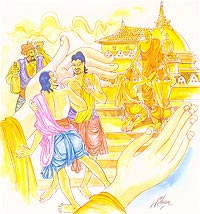 |
Verse 77. The Virtuous Cherish Good Advice
Explanation: The wise and good person who reproaches and warns, |
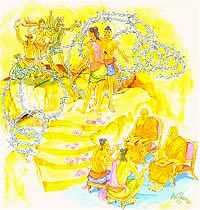 |
Verse 78. In The Company Of The Virtuous
Explanation: Do not associate with people who have evil ways. |
 |
Verse 79. Living Happily In The Dhamma
Explanation: One who delights in “The Teaching” |
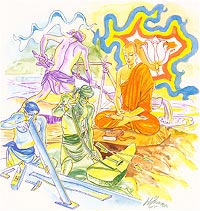 |
Verse 80. The Wise Control Themselves
Explanation: The irrigator who manages water is skilled in |
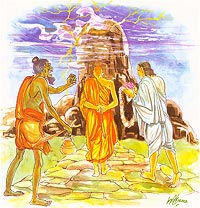 |
Verse 81. The Wise Are Steadfast
Explanation: The wise remain unmoved and unruffled both by |
 |
Verse 82. The Wise Are Happy
Explanation: The exceedingly deep oceans are tranquil, calm |
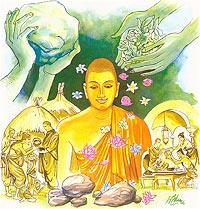 |
Verse 83. The Wise Are Tranquil
Explanation: The noble and wise persons are not attached to |
 |
Verse 84. The Wise Live Correctly
Explanation: Not for one’s own benefit nor for that of |
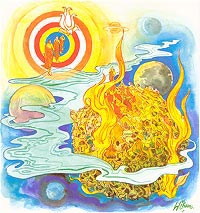 |
Verse 85. A Few Reach The Other Shore
Explanation: Of those who wish to cross over to the other |
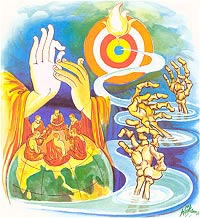 |
Verse 86. Those Who Follow The Dhamma Are Liberated
Explanation: The realms over which Mara has sway, are difficult |
 |
Verse 87. Liberation Through Discipline
Explanation: The wise person abandons fully and totally those |
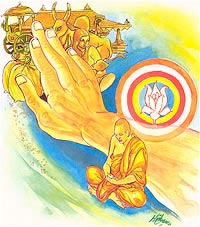 |
Verse 88. Purify Your mind
Explanation: He takes interest in liberation. He gives up |
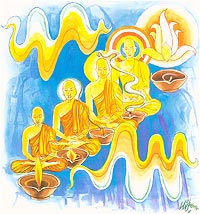 |
Verse 89. Arahats Are Beyond Worldliness
Explanation: There are those wise individuals who have practiced |
 |
Verse 76. Treasure The Advice Of The Wise
Explanation: If one discovers a wise person |

